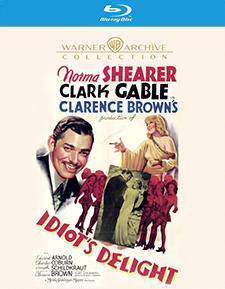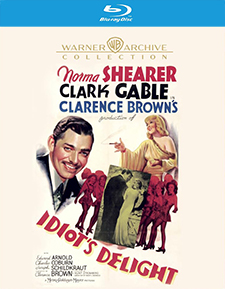Idiot's Delight (Blu-ray Review)

Director
Clarence BrownRelease Date(s)
1939 (August 13, 2024)Studio(s)
Metro-Goldwyn-Mayer (Warner Archive Collection)- Film/Program Grade: B
- Video Grade: A
- Audio Grade: A
- Extras Grade: B-
Review
Robert E. Sherwood won the Pulitzer prize for his allegory satire Idiot’s Delight. MGM purchased the film rights and hired Sherwood to adapt it for the screen. The film was released in 1939, the year World War II began in Europe and before the United States entered the war. At the time, it was impossible to know how long the war would last, whether America would send troops, or that millions would die, including innocent civilians targeted by Hitler.
Song-and-dance man Harry Van (Clark Gable, Gone With the Wind) returns from World War I with a good record but has trouble landing a job on Broadway. He flits from one dead-end job to the next, hawking snake oil remedies, selling encyclopedias door to door, and finally wins a minor show biz gig assisting elderly Madame Zuleika (Laura Hope Crews, Camille) in a mind reading act. During a performance in an Omaha theater, Zuleika gets too drunk to respond properly to the cue she gets from Harry. Irene (Norma Shearer, The Women), an acrobat waiting in the wings, tries to surreptitiously give Zuleika the correct response, but the audience hears the whispering, catches on that the mind reading demonstration is a fake, and storms out of the theater.
Irene comes to Harry’s dressing room to apologize, saying she was only trying to help, since she had learned some of the verbal code between Zuleika and Harry. She’s eager to move up in the business and hopes to form a partnership with Harry, practically fawning over him. They enjoy a week together but eventually go their separate ways and hope to get back together sometime in the future. But ten years pass. Harry has never hit the big time but has managed to put together an act with six pretty girls—Harry Van and Les Blondes.
On the eve of World War II, while on a European tour, Harry and the girls are on a train passing through the Italian Alps, headed for a booking in Switzerland, when the passengers are ordered off the train because it will not be permitted to cross the border. Harry, the girls, and all the other passengers must stay at the only nearby lodging, a fancy mountain-top hotel adjoining an air base. The other passengers turned involuntary hotel guests include German scientist Dr. Waldersee (Charles Coburn, The Paradise Case), on the verge of curing cancer; American anti-war activist Quillery (Burgess Meredith, Of Mice and Men); wealthy international munitions dealer Achille Weber (Edward Arnold, The Hucksters); and Weber’s voluptuous companion Irena, a lavishly gowned, aristocratic woman with a Russian accent who bears a startling resemblance to Irene from Omaha. She pretends not to recognize Harry and, amused at her charade, he plays along.
The plot is based on disguises and cons. Every guest at the hotel is phony in one form or another except Quillery, the idealist. Their lives haven’t yet recovered from World War I and another war appears inevitable. Most choose opportunity and greed above patriotism. A few do not, and one of those is sadly misguided. The dialogue is bathed in cynicism, very unusual for a film from a major studio during Hollywood’s Golden Age.
Idiot’s Delight was given a lush production, with MGM’s biggest stars of the period, Gable and Shearer. The highlight of the film is a song-and-dance routine to Puttin’ on the Ritz by Gable and Les Blondes, his only number in the film. Though no Astaire, he handles the simple choreography well enough, his baritone is passable, and he winds up by throwing himself into the arms of his back-up girls. The number is a welcome interlude in what is primarily a talk fest. Gable grounds the film with his average Joe charm and masculine appeal.
Shearer has fun playing a sort of dual role as Irene/Irena. Irene is a vaudeville entertainer whose job is hanging by her teeth as she’s spun high above the stage. She sees in Harry a chance to move ahead and is hardly immune to his sex appeal. She practically begs to partner him in a mentalist act, but they part company and go their separate ways. As the mysterious Russian exiled noblewoman Irena, Shearer is the epitome of exaggeration. Sporting a platinum blonde wig and richly elegant gowns, she glides through the hotel’s foyer, grandly admires the Alpine mountains through the hotel’s large picture windows, waves a cigarette holder to punctuate her pronouncements, spins yarns about her escape from the Bolsheviks, and dreamily revels in Russian folk songs.
The chemistry between Gable and Shearer is excellent. This was the third and final picture they would make together. Their characters are both hucksters—Harry will try anything to get ahead while Irene transforms herself into an exciting, vibrant fiction. Harry’s fascination with Irene explains why he goes along with her alternate persona for so long, but this device might have worked better on stage than in a film.
The film is dialogue-heavy once the guests are assembled at the hotel. The nature of the play makes it difficult to open it up cinematically. Irena’s aggrandizing elaborations of her past become a bit tiresome. Meredith is over the top as the pacifist. He seems constantly crazed, his warnings of imminent war delivered in frenzied, wide-eyed agitation. Arnold conveys smarminess as the opportunistic arms dealer, and Coburn, as the German scientist who decides to abandon his cancer research to return to his home country to invent new weapons for its war effort, hardly registers. Also in the cast are Joseph Schildkraut (The Diary of Anne Frank) as Captain Kirvinne, assigned to diplomatically prevent the hotel guests from crossing the frontier, and Fritz Feld (Silent Movie) as a hotel employee.
Director Clarence Brown, a fixture at MGM, does a good job balancing politics with comedy and romance. The anti-war message may not always be clear to modern viewers, but the closing of borders, the planes performing maneuvers in preparation for battle, and the guests unable to reach their destinations create a sense of anxiety. War’s in the air, and the hotel may prove dangerous for those who remain. The film seems to yearn for an answer to a world gone mad yet finds none. There’s a sense of resignation and helplessness in the face of world turmoil.
Idiot’s Delight was shot by director of photography William Daniels on 35 mm black & white film with spherical lenses and presented in the Academy aspect ratio of 1.37:1. As in previous Warner Archive releases of older films, picture quality is sharp, with an overall silvery tone to the print. Rear projection is used in the scenes in which Irene is shown in close-up hanging by her teeth in her acrobatic act, and in the hotel when planes and explosions are seen through the large windows of the hotel. Essentially a one-set film, MGM nonetheless provides it with lavish production values courtesy of Cedric Gibbons and Edwin B. Willis. Shearer’s costumes, by Adrian, give the actress a glamorous look and contribute to her alter ego as a Russian expat. The dresses and hats on Les Blondes are pretty and reflect what working-class women of the period would have worn.
The soundtrack is English 2.0 DTS-HD Master Audio. English SDH subtitles are an option. Dialogue is clear and distinct throughout. As Irena, Norma Shearer speaks with a Russian accent. None of the other actors attempt foreign accents. Sound effects include airplane engines, bombs exploding, and walls and ceilings of the hotel crashing in. The songs Over There and By the Light of the Silvery Moon set the early scenes right after the First World War. Harry and Les Blondes perform a spirited rendition of Puttin’ on the Ritz, accompanied by the hotel orchestra. Irena, in a nostalgic mood, hums old folk songs as she plays the piano.
Bonus materials on the Blu-ray release from the Warner Archive Collection include the following:
- The Good Egg (7:36)
- It’s an Ill Wind (7:29)
- Alternate Ending (3:23)
- Original Theatrical Trailer (3:58)
The Good Egg – In this 1939 Technicolor Merrie Melodies cartoon directed by Chuck Jones, a hen with no chicks adopts an egg she believes to be a chicken egg, but it hatches into a turtle. Naturally, the turtle doesn’t fit in with the baby chicks. The turtle becomes the butt of jokes for the chicks until several of them start to drown in a makeshift boat. The turtle saves the day and is given the role of life guard on the boat.
It’s an Ill Wind – Porky Pig and his friend Dizzy Duck go fishing, but their trip is ruined by a thunderstorm. They find shelter in an old yacht club house that appears to be haunted, but their biggest problems come from a bearskin on a chair, a dog stuck in a diving helmet, and their own clumsiness. This 1939 black & white Looney Tunes cartoon was directed by Ben Hardaway and Cal Dalton.
Alternate Ending – A screen note states that this is the ending seen by audiences in the United States and Canada when Idiot’s Delight was first released in 1939. It reflects a defiant optimism. Explosions destroy part of the hotel as planes drop bombs literally outside the hotel’s huge picture windows. The bombings abate, the planes leave, and Irene and Harry talk about starting a mentalist act together as Harry plays a wrecked piano and Irene imagines her new show biz persona—Mamoora the Great.
Idiot’s Delight alternates between comedy and drama, so that its anti-war message might not be fully realized. Gable and Shearer are a solid screen pairing, and the screenplay by Robert E. Sherwood from his own stage play is literate, witty, and often poignant. Made in 1939, the year many consider the greatest in movie history, the film was overshadowed by a number of other exceptional films but remains a fascinating look at Hollywood’s view of worldwide conflict before America entered World War II.
- Dennis Seuling

